新概念英语教案 第二册第二课 完美版
- 格式:doc
- 大小:38.13 KB
- 文档页数:18
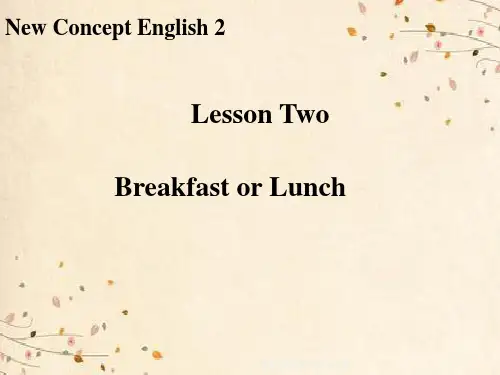
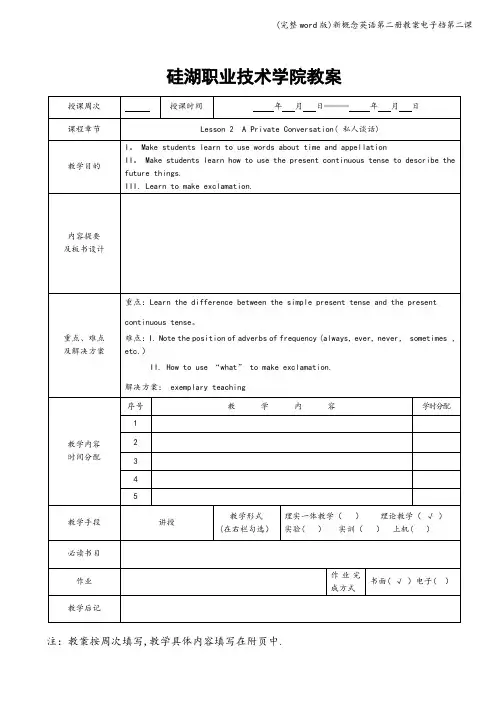
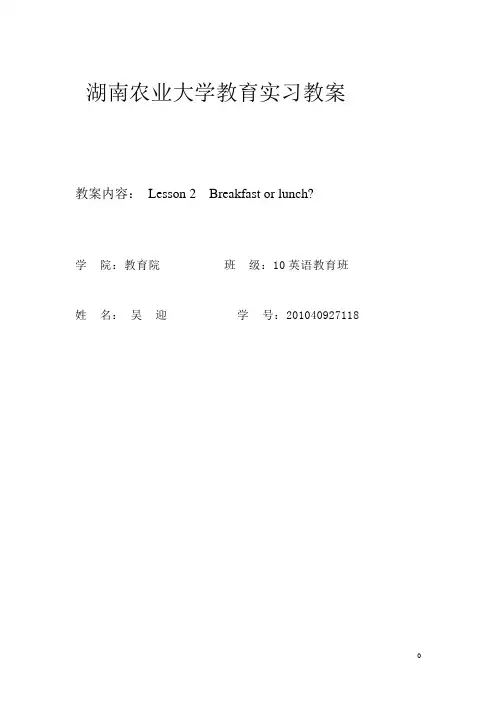
湖南农业大学教育实习教案教案内容:Lesson 2 Breakfast or lunch?学院:教育院班级:10英语教育班姓名:吴迎学号:201040927118Lesson 2 Breakfast or lunch?Teaching Aims and demands:1.Review the usage of Special Question.2.Master the usage of present continuous , and the word ―what‖.3.Grasp the following words and phrases:until, outside, ring, aunt, repeat, get up , stay, look out of, what a day, just then, by train, have breakfast,dear me.4.Learn a kind of word formation by adding affix —affixation5. Practice oral English with the topic ―A great breakfast I have at primary school/university‖.Teaching Content: Text ; Exercises (from Vocabulary to Writing)Teaching Key points and difficult points:1.the usage of present continuous.2.until, ring, repeat, get up, stay, look out of, just then, dear me.Teaching Periods: 6 periodsTeaching Procedures:Period 1-2:Ⅰ. Introduction to the text by asking some questions.Questions:1.Is it hard for you to get up early?2.Do you usually stay in bed very late?3.What time do you get up everyday?4.Do you usually have breakfast in lunchtime? Why?5.Do you remember your last brunch in school?6.Do you think it’s good for your health to have breakfast in lunchtime? Why?7.How do you usually make yourself have breakfast at the right time?8.Can you be an early bird for a month? ―Yes‖ or ― No‖?Ⅱ.Ask students to go through the text and finish the pre-class work to get the main idea of the text. Then analyze the text the general idea .Ⅲ. Explain the text in details.1. until prep. : up to the point in time or the event mentioned.e.g: Until she spoke I hadn’t realized she wasn’t English.You can stay on the bus until London (=until you reach London.)*from morning ~night.※ till (informal)1) conj./prep =untile.g. :Can’t you wait till we get home?2) n. the place were you pay for goods in a large shop/store.*a long queue at the tille.g. :Please pay at the till.3) v. (old use) to prepare and use land for growing crops.Usage Note:Till is generally felt to be more informal than until and is used much less often in writing. At the beginning of a sentence, until is usually used.2.outside1). adv. not in a room,building or container but on or to the outside of it. 在外面,向外面e.g. I’m seeing a patient ---please wait outside.It’s warm enough to eat outside.2) n. The outer side or surface of sth 外部e.g. I didn’t go into the temple---I only saw it from the outside.* At the ~ = at the moment = as a maximum* on the ~ :①Used to describe how sb appears or seemsOn the outside she seems calm, but I know she’s worried.②Not in prionLife on the outside took some getting used to again.3) adj./prep.She has a lot of outside interests (= not connected with her work)They fell cut off from the outside world.(=from other people and from other things that were happening) ~ chance of winning 胜算极小~of = apart frome.g. There was nothing they could do, outside of hoping things would get better.3.ring1) v. (rang, rung)~ sb. upI’ll ring you up later.~ sth. upShe rang up all the items on the till.~ for sth.Could you ring for a cab.~ (with sth.): to be full of a sound. 回想Applause rang through the hall.~ offHe rang off before I could explain.2) n.①give sb a ~: to make a telephone call to sb.E.g. I’ll give you a ring tomorrow.have a ~ of truth 真实可信E.g. His explanation has a ring of truth about it.②circleA key ~E.g. The children sat on the floor in a ring.③JewelleryE.g. A diamond glittered on her ring finger.4 .aunt : the sister of your father or mother; the wife of your uncle.E.g. My aunt lives in Canada.Auntie (= aunty ):Auntie Mary.5.repeat v.1) say/write again.To ~ a question.Do say if I’m repeating myself (=if I have already said this).He’s fond of repeating that the company’s success is all down to him.2) do againThey are hoping to repeat last year’s victory.To ~the class /year/grade(=in a school, to take the class/ year /grade again)重修这门课;重读一年;留级3)happen againHistory has a strange way of repeating itself.Repeatable adj. (usually in negative sentences)Repeated adj. (happening, said or done many times)~ absences from work.Repeatedly adv.E.g. The victim had been stabbed repeatedly in the chest.6 . get up: to stand up after sitting, lying, ect. ; to get out of bed.E.g. The class got up when the teacher came in.Could you get me up at 6:30 tomorrow.7.Stay1) stay in : to not go out or to remain indoorsE.g. I feel like staying in tonight.2)stay up : to go to bed later than usual.E.g. You’ve got school tomorrow. I don’t want you staying up late.3) stay away (from sb /sth): to not go near a particular person or place.E.g. I want you to stay away from my daughter.8.lookE.g. The teacher told us to look at the blackboard.That looks like an interesting film.Glance: take a quick look.E.g. She glanced at her watch during the talk.Gaze :a long steady look at sb/sth.E.g. She felt embarrassed under his steady gaze.Glare : a long angry look at sb/sth.E.g. The old woman glared at him9.Just then: at the momentE.g. Just then, someone knocked at the front door.Just then, my girlfriend drove up and gave me a ride.10.Dear me: used in expression that show that you are surprised, upset, annoyed or worried.E.g. Dear me! What a mess!Dear oh dear! What are you going to do now?11.What a day! =what a day it is ! =>elliptical sentenceE.g. This is a beautiful picture.= What a beautiful picture.She is careless. = How careless she is.12.I’m comeing to see you.Be +Ving +to : used to show that sth is likely to happen very soon or in the future.E.g. I think I’m going to faint.Look at these black clouds--- it is going to rain.15. Word formation-----affixationAdv. –ly(the suffix –ly ,from Middle English, is added to adjectives to form adverbs.)adj. Adv.repeated repeatedlylate latelyPeriod 3-4Ⅳ. Do some oral practice.1.Ask students to retell the story based on the following questions by using theexpressions in the text.Questions concerned:a. Does the writer always get up early on Sunday, or does he always get up late?b.Did he get up early last Sunday, or did he get up late?c.Who telephoned then?d. Had she just arrived by train, or had she come on foot?e.Did he say,’ I’m still having breakfast’, or did he say ,’ I am still in bed’?f.Was his aunt very surprised or not?g.What was the time?2.Topic: A great breakfast I have at primary school/universityExpressions for reference:(great,campus, delicious, roommates, cheap, etc.)(unforgettable, amusing, surprised, various, etc.)Ⅴ. WritingAsk students to write a summary about this text in not more than 55 words.Ⅵ. ConclusionAsk some students to read their summaries and evaluate the best one. Analyze the reasons why his/hers is the excellent.(talk about the skills)Period 5-6Ⅶ. Do some exercises in class and check the answers.1. When Aunt Lucy telephoned _____.A.the writer was asleep.B. the writer was still in bed.C. the writer had already got up.D. the writer was having lunch.2. Aunt Lucy was surprised because_____.A. the writer was having lunch.B. it was one o’clock.C. it was late.D.the writer was having breakfast at lunchtime.3. Write these sentences again. Each sentences must begin with what.a. This is a wonderful garden!b. This is a surprise!c. He is causing a lot of trouble.d. They are wonderful actors!e. She is a hare-working woman.f. You are a clever boy.4. Give the correct form of the words in parentheses.a. he is still _______(sleep).b. It (begin) to rain before she took a taxi.c. When all the guests had left, Derek (arrive).Ⅷ.Assignments :1. Structure& V ocabulary : P192. Writing: An unforgotten day in school.。
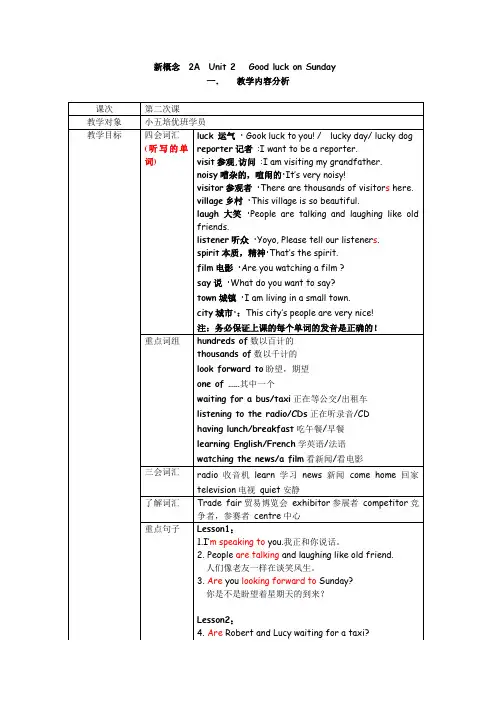
新概念2A Unit 2 Good luck on Sunday一.教学内容分析—Yes,they are./No, they aren’t.5. Who are waiting for a taxi? 谁正在等出租车?—Robert and Lucy (are).6. What are they waiting for?他们正在等什么?—(They’re waiting for) a taxi.7.What are Robert and Lucy doing?Robert和Lucy正在做什么?—They’re/They are waiting for a bus.他们正在等公共汽车。
注:本副课主要讲授并练习第一人称复数和第三人称复数的现在进行时,特殊疑问句及其回答。
语音教学/ai/ apply buy cry deny die fly lie reply/ai-iŋ/ applying buying crying denying dyingflying lying replying相关语法 1.现在进行时的用法。
注:本次课的第一个语法在第一次课已有一个初步的认识,这次课主要是先复习再进行具体的讲解及巩固。
现在进行时:表示现阶段已正在进行或发生的事2.反问疑问句句型。
注:本次课的这个语法是五年级第一次接触到,所以一定要简而明的讲授。
难点:1. 反义疑问句:表示提问者对某事有一定主见,但是没有把握,希望对方来证实。
2. 结构:前面是肯定陈述句,后面加省略问句的否定式。
【重点提示】1.前肯,后否;前否,后肯。
2.回答,不管问题的提法如何,若事实是肯定的,就用yes回答,事实是否定的,就用no回答。
注意中文翻译.教学辅助手段粘球课文视频PPT 音标操教学用具课堂奖励机制小组pk ,个人扔筛子加分,打比赛加分,抽奖加分二.课堂教学过程(第一节课)时间教学步骤备注A: What are they doing?B: They are waiting for a bus.2.学生口头回答课文P16 Guided Summary练习题并校对。


Lesson twoWhat was the weather like last Sunday?Who was coming to see the writer?Why was the writer’s aunt surprised?Breakfast or lunch?【NEW WORDS AND EXPRESSIONS】The meeting did not start_____ everyone was there.A. becauseB. untilC. whyD. ifThe boy______ to bed _______ his mother came in.A. went not; untilB. didn’t go; afterC. went; untilD. didn’t; until★until prep.直到直到...才; 直到...为止后面加(时间状语)从句,前面就是主句1) His father didn't die until he came back. (肯定)直到他回来,他爸爸才死。
2) His father was alive until he came back. (否定)直到他回来为止,他爸爸都是活着的。
I stay in bed until twelve o'clock.I didn't get up until 12 o'clock.★outside adv. 外面作状语He is waiting for me outside.It is cold outside.★ring(rang.rung) v.(铃、电话等)响(刺耳的)The telephone (door bell) is ringing.jingle(bell): (铃儿) 响叮当给某人打电话: ring sb.Tomorrow I'll ring you.打电话(名) : give sb. a ringremember to ring me/ remember to give me a ring戒指(名词)★aunt n.姑,姨,婶,舅妈uncle: 叔叔cousin: 堂兄妹nephew: 外甥niece: 外甥女★repeat v.重复【TEXT】It was Sunday. I never get up early on Sundays. I sometimes stay in bed until lunchtime. Last Sunday I got up very late. I looked out of the window. It was dark outside. 'What a day!' I thought. 'It's raining again.' Just then, the telephone rang. It was my aunt Lucy. 'I've just arrived by train,' she said. 'I'm coming to see you.''But I'm still having breakfast,' I said.'What are you doing?' she asked.'I'm having breakfast,' I repeated.'Dear me,' she said. 'Do you always get up so late? It's one o'clock!'New words and expressions 生词和短语until prep. 直到outside adv. 外面ring v. (铃、电话等)响aunt n. 姑,姨,婶,舅母repeat v. 重复【课文讲解】On Sundays: 所有的星期天,每逢星期天never: 从来不(可以直接用在动词前面)=not (变成否定句,前面一定要加助动词)I don't like her.=I never like her.因为是上个星期,所以时态不是一般现在时。

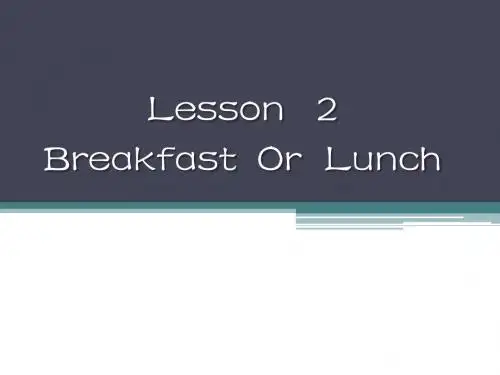

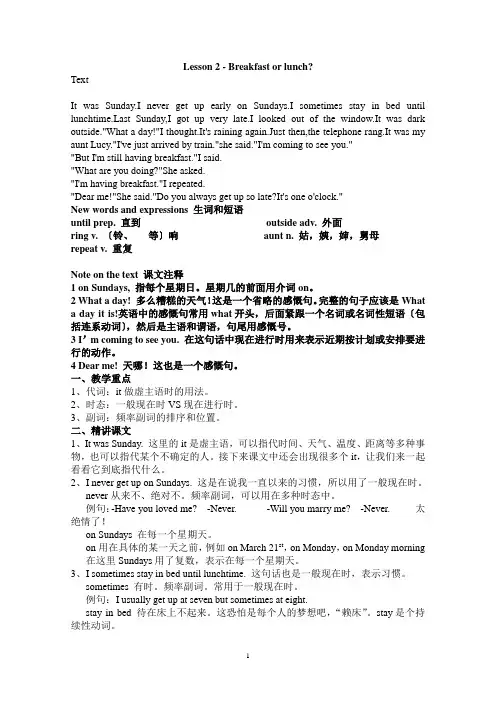
Lesson 2 - Breakfast or lunch?TextIt was Sunday.I never get up early on Sundays.I sometimes stay in bed until st Sunday,I got up very late.I looked out of the window.It was dark outside."What a day!"I thought.It's raining again.Just then,the telephone rang.It was my aunt Lucy."I've just arrived by train."she said."I'm coming to see you.""But I'm still having breakfast."I said."What are you doing?"She asked."I'm having breakfast."I repeated."Dear me!"She said."Do you always get up so late?It's one o'clock."New words and expressions 生词和短语until prep. 直到outside adv. 外面ring v. 〔铃、等〕响aunt n. 姑,姨,婶,舅母repeat v. 重复Note on the text 课文注释1 on Sundays, 指每个星期日。
星期几的前面用介词on。
2 What a day! 多么糟糕的天气!这是一个省略的感慨句。
完整的句子应该是Whata day it is!英语中的感慨句常用what开头,后面紧跟一个名词或名词性短语〔包括连系动词〕,然后是主语和谓语,句尾用感慨号。
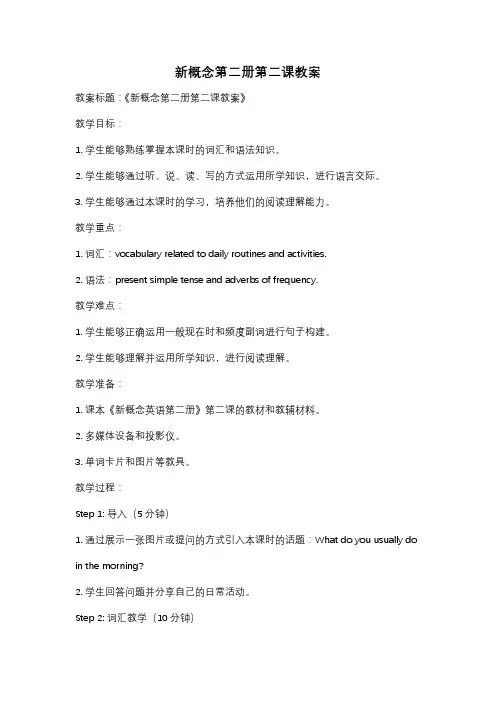
新概念第二册第二课教案教案标题:《新概念第二册第二课教案》教学目标:1. 学生能够熟练掌握本课时的词汇和语法知识。
2. 学生能够通过听、说、读、写的方式运用所学知识,进行语言交际。
3. 学生能够通过本课时的学习,培养他们的阅读理解能力。
教学重点:1. 词汇:vocabulary related to daily routines and activities.2. 语法:present simple tense and adverbs of frequency.教学难点:1. 学生能够正确运用一般现在时和频度副词进行句子构建。
2. 学生能够理解并运用所学知识,进行阅读理解。
教学准备:1. 课本《新概念英语第二册》第二课的教材和教辅材料。
2. 多媒体设备和投影仪。
3. 单词卡片和图片等教具。
教学过程:Step 1: 导入(5分钟)1. 通过展示一张图片或提问的方式引入本课时的话题:What do you usually do in the morning?2. 学生回答问题并分享自己的日常活动。
Step 2: 词汇教学(10分钟)1. 教师出示相关的图片或单词卡片,教授与日常活动相关的词汇,如brush teeth, have breakfast, go to school等。
2. 学生跟读并模仿教师的发音。
Step 3: 语法讲解(15分钟)1. 通过多媒体展示一般现在时和频度副词的用法,解释其构成和用法。
2. 教师示范并解释一般现在时和频度副词在句子中的位置和用法。
3. 学生跟读并进行口头练习。
Step 4: 练习活动(20分钟)1. 学生分组进行对话练习,使用一般现在时和频度副词描述自己的日常活动。
2. 学生通过听力练习,听录音并选择正确的答案。
3. 学生进行阅读理解练习,回答与课文相关的问题。
Step 5: 巩固与拓展(10分钟)1. 教师与学生一起总结所学内容,复习一般现在时和频度副词的用法。
Lesson 2 Breakfast or lunchIt was Sunday. I never get up early on Sundays. I sometimes stay in bed until lunchtime. Last Sunday I got up very late. I looked out of the window. It was dark outside. "What a day!" I thought. "It's raining again." Just then, the telephone rang. It was my aunt Lucy. "I've just arrived by train," she said. "I'm coming to see you.""But I'm still having breakfast," I said."What are you doing?" she asked."I'm having breakfast," I repeated."Dear me," she said. "Do you always get up so late? It's one o'clock!"Listening Practice.It was _______. I never get up early on Sundays. I sometimes stay in bed until lunchtime. Last Sunday I got up very late. I looked out of the window. It was _______ outside. "What a day!"I thought. "It's raining again." Just then, the _______ rang. It was my aunt Lucy. "I've just _______ by train," she said. "I'm coming to see you.""But I'm still having _______," I said."What are you doing?" she asked."I'm having breakfast," I repeated."Dear me," she said. "Do you always get up so late? It's one o'clock!"Shadow PracticeWord Practice直到__________________ 外面__________________ (铃,电话等)响__________________ 姑,姨,婶,舅母__________________重复__________________Phrase Practice早早起床___________________________每逢周日___________________________呆在床上___________________________往窗外看___________________________天黑了_____________________________电话响了___________________________乘坐火车___________________________我将要来看你_______________________吃早饭_____________________________Tense PracticeFind out the past tense and transform the past tense into original formSentence PracticeTranslate the sentences.每个周日我从不早起。
新概念第二册Lesson2教案第一篇:新概念第二册Lesson2教案Lesson 2 Breakfast or lunch? 生词和短语☆until prep.直到后面加(时间状语)从句,前面就是主句区分“直到……才”(not until)和“直到……为止”(until)的方法:把until作为时间终止线。
从句的时间终点之前,这个动作做了还是没做?做了——肯定;没做——否定。
1)His father didn't die until he came back.(肯定)直到他回来,他爸爸才死。
2)His father was alive until he came back.(否定)☆outside adv.外面(作状语)e.g.He is waiting for me outside.☆ring(rang,rung)v.(铃、电话等)响[注]这种响是刺耳的,往往是提醒人做某事如:The telephone/door bell is ringing.而风铃等响要用jingle jingle(bell):(铃儿)响叮当v.给某人打电话:ring sb n.打电话:give sb a ring Remember to ring me.=Remember to give me a ring.n.戒指☆aunt n.姑,姨,婶,舅母所有长一辈的女性都用这个称呼与此相同,男性则是uncle 他们的孩子:cousin:堂兄妹(不分男女)cousin的孩子:nephew:外甥,niece:外甥女[记:“捏死”]☆look out of out of是固定搭配☆感叹句What+a/an+adj.+n+主语+谓语省略:1.主、谓随时可省eg.What a good girl(she is)!2.省形容词[注]有上下文和一定的语境,才能省略形容词。
不能给对方造成误解。
如本文的What a day!根据上下文的It was dark outside.和It's raining again.可以推断出省略的是terrible.☆It was my aunt Lucy.如果不知道对方性别时,可以用it取代。
Lesson 2 Breakfast or lunch?生词和短语until prep. 直到outside adv. 外面ring v. (铃、电话等)响(rang, rung)aunt n. 姑,姨,婶,舅母repeat v. 重复★un til prep.直到…时候till 直到(多用于口语)I sometimes stay in bed until lunchtime. The street is full of cars from morning till/to night.Conj. 直到。
时候(后面加句子)I stayed in bed until he woke me up. I didn 'tget up until he woke me up.Until 主句中动词为延续性动词not … until 主句中动词为非延续性动词I will wait for you until you comeback. I won't leave until you comeback. until用于表示动作、状态等的持续,可译为“一直到............... 为止”或“在... 以前” <在肯定句中,它与表示持续性状态的动词连用,表示持续到某一时刻:I'll wait here until 5. 我会在这里等到5 点钟。
His father was alive until he came back. 直到他回来为止,他爸爸都是活着的. 在否定句中,它通常与描述短暂动作的动词连用,表示“到……为止” 、“直到…… 才”:She cannot arrive until 6. 她到6点才能来。
His father didn't die until he came back. 直到他回来,他爸爸才死.until(后的从句)的时间终止之前,这个动作做了还是没做?做了前面的主句用肯定;没做前面的主句用否定For he ___A(C)___(wait) until it stopped raining.A. waitedB. didn't waitA. leaveB. leftC. didn't leaveI stay in bed until twelve o'clock.I didn't get up until 12 o'clock.★outside adv. 外面(作状语)n/adj/prepn. the outside of the house adj. an outside toilet adv. it was dark outside/please wait outside prep. It is outside my business inside n/adj/prep/advHe is waiting for me outside.It is cold outside.★ring(rang. rung) v.(铃、电话等)响①vt. 鸣,(铃、电话等)响(这种响是刺耳的, 往往是提醒人做某事)Every morning the clock rings at 6.The telephone(door bell) is ringing. 而风铃等响要用jingle,jingle (bell)(铃儿)响叮当②vt. 打电话给(美语中用call)ring sb. (up)给某人打电话call sb telephone sb give sb a call ring off 挂电话=ha ng off he ring off the phone before I could expla in.Tomorrow I'll ring you.③n. (打)电话give sb. a ringRemember to give me a ring. /Remember to ring me.④n. 戒指,环状物A wedding ring a diamond ring a gold ring dark rings around her eyes 黑眼圈ring-road 环状公路ring finger 无名指thumb 大拇指index finger/the first finger 食指中指pointer/middle finger/the second finger 小拇指pinkie/little pinger12^ aunt n.姑,姨,婶,舅妈(所有长一辈的女性都用这个称呼)男性则是uncle: 叔叔他们的孩子:cousin 堂兄妹(不分男女)cousin的孩子:nephew夕卜甥;niece夕卜甥女★ repeat v. 重复①vt. 重复Will you repeat the last word?They are repeating that wonderful paly.“Iam having breakfast”, I repeated②vi. 重做,重说Please repeat after me.Don't repeat.Repetition n 重复learn by repetition【Text】It was Sunday. I never get up early on Sundays. I sometimes stay in bed until lunchtime. Last Sunday I got upvery late. I looked out of the window. It was dark outside. 'What a day!' I thought. 'It's raining again.' Just then, thetelephone rang. It was my aunt Lucy. 'I've just arrived by train,' she said. 'I'm coming to see you.''But I'm still having breakfast,' I said.'What are you doing?' she asked.'I'm having breakfast,' I repeated.'Dear me,' she said. 'Do you always get up so late? It's one o'clock!'参考译文:那是个星期天, 而在星期天我是从来不早起的, 有时我要一直躺到吃午饭的时候. 上个星期天, 我起得很晚. 我望望窗夕, 夕面一片昏暗. “鬼天气!” 我想, “又下雨了. “正在这时, 电话铃响了. 是我姑母露西打来的. “我刚下火车, “她说, “我这就来看你. ““但我还在吃早饭, “我说.“你在干什么?” 她问道.“我正在吃早饭, “我又说了一遍.“天啊, “她说, “你总是起得这么晚吗?现在已经 1 点钟了!” 【课文讲解】1、It was Sunday.it指时间、天气、温度或距离,it被称为“虚主语” (empty subject)。